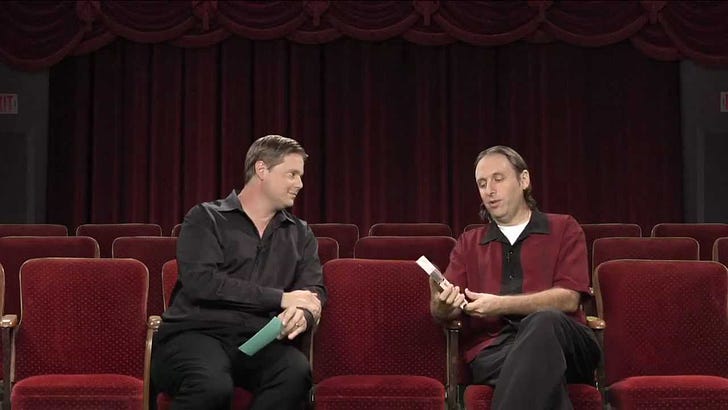Apologies for taking an unannounced break from the newsletter, but it is what it is and now you’re reading the new one :) As for this edition, it’s about On Cinema and how this cult cross-media format does some spot-on contemporary satire as well as some media critique of its own. I touch upon some stuff I have already discussed in the meta-comedy article and the cringe capitalism one, but this time I take it slower. Scroll below the warm-up link.
I’ve discussed Joe Rogan at length in this newsletter edition here, but here’s a much better critique by one of the protagonists of this week’s article. Enjoy.
Big thanks to my friend Stefano Brilli for suggesting the video above and getting me deep into On Cinema in the first place.

I first came across Tim & Eric when I watched their Billior Dollar Movie ages ago, but for some reason I did not really get too deep into their world. I did catch up on the show to an extent, but once I took in enough of the postmodern-psychedelic imagery I must have been like “I get it”. I do enjoy the absurd, the dark and the genuinely silly, but I tend to forget sketches that do not involve characters that evolve along some kind of plot. I guess it’s the same reason I am much more of a fan of South Park than Family Guy (and I pretty much agree with Stone and Parker’s satire of the latter). For this reason, when it comes to the uber-prolific Tim Heidecker, I have always been more into the stuff he does with Gregg Turkington (aka Neil Hamburger). From The Comedy and Entertainment (two movies that explore important cultural and even existential nuances of the comedic) to their double (anti)stand-up comedy act, the two embody something that goes beyond the caricature of the amateur or “hack” comedian, channeling instead more ambiguous and subterranean aspects of the performative act as a matter of endurance and identification. The On Cinema universe is the duo’s longest-running project yet, and while I was tangentially aware of it through Twitter it was only through a recent deep dive that I started to truly appreciate its value.
At the core, On Cinema is based on a very simple format: in every episode, two characters (significantly named Tim Heidecker and Gregg Turkington) review a couple films, rating them a certain number of bags of popcorn each. Initially the show is funny because neither of the two seems to have anything interesting to say about the movies, which are awarded the highest number of bags of popcorn possible almost every time. As the format evolves, however, the two uninspired fanboys gradually reveal two very different personalities, each representing a very specific type of fan (or, On Cinema being an Internet show, different Internet users).
Tim is clearly using the show as an outlet to air his personal grievances and find a purpose in life: he alternates enthusiastic commitment, narcissistic manipulative behaviors, and bouts of rage, and quickly abandons his movie critic persona to embrace increasingly volatile identities. Some of these identities are artistic — he creates a spin-off series where he himself impersonates an all-American, proto-Trumpian rogue agent called Decker, then decides to pursue music (first in a rock band called Dekkar, then as solo EDM act DKR and finally as the promoter of a music festival that ends in tragedy) — while others are inevitably fraudolent entrepreneurial endeavors often inspired by shady figures he looks up to (like his personal guru Doctor San, with whom he starts a vaping business).
In contrast to Tim’s erratic shape-shifting and toxic resilience, Gregg is instead squarely at ease only as a movie expert, a status he defends despite the repeated humiliations his partner subjects him to over and over. A very sophisticated critic he is not (his overall taste seems to focus on exclusively Hollywood-produced, mostly mainstream movies, and he seems to be obsessed with trivial facts like movie duration rather critical insight), but he is very territorial and competitive in his own, passive-aggressive way. This personality anchors him to Tim in a co-dependent bromance that is purely fueled by his desperate commitment to the On Cinema brand, to which he more than willingly lends “expertise” (one of his favorite words) and customized gadgetry ideas.
Season by season, Tim and Gregg are joined by a growing range of regulars, often appearing with their own names (Joe Estevez, Mark Proksch), but the tension between the two characters outlined above is always the engine behind the main overarching plot: what is On Cinema and where is it headed?
Born as a casual parody of homemade podcasts (and podcasters), On Cinema has in fact become a much more layered and elaborate satirical take on cultural production in the age of social media. The very traditional character tension discussed above is in fact sustained by the other notable feature of OnCinema: its cross-media and cross-platform evolution. Starting as audio only, over the years the format has evolved into the main video series (YouTube, then Adult Swim, finally a subscription-based website called HEI Network) and ultimately a sprawling universe comprising the multi-season spin-off series Decker, several musical audio tracks, regular Oscar specials, one season-wide trial special, an app, and real-world gatherings.
This cross-media, cross-platform character is what really grounds the performative endurance mentioned in the beginning. Not only do Tim and Gregg bring their tongue-in-cheek beefs over to “external” platforms like Twitter, at every step of the way the show itself unflinchingly identifies with the formats it targets, while also reflecting the tense instability of Tim and Gregg’s relationship. We witness this on a purely aesthetic level in the way the graphics frantically try to keep up with the two’s competitive popcorn ratings, interjecting into the discourse as they try to one-up each other’s praise; we also see it in a structural way as the live Oscar specials trudge behind Tim’s capricious changes of schedule, or as Tim’s libertarian independentism and penchant for get-rich-quick Ponzi schemes lead the show to its most recent HEI Network incarnation — which includes a system of community points akin to the cryptocurrencies and tokenisation shenanigans we’ve become familiar with by now.
If a postmodern attitude has always been a mark of Tim and Eric’s aesthetics, the material infrastructure and platformed nature of On Cinema makes its performative endurance all the more impressive. Over more than a decade, in fact, the battle between the cross-media believer (Tim) and the territorial fanboy (Gregg) also serves as a satirical take not only on what was Trump’s America, but what it means to look for purpose in a disintegrated mediascape where cultural identification and financial gain captivate communities through promises of intangible, volatile value(s).







